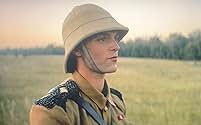This is a Netflix documentary so we get that treatment; talking heads and experts and, more unpalatable to me, staged re-enactments with actors on 'probable' scenes. It's high budget cable television.
The prewar portion may be the most informative in how it shapes the famous wartime Winston. Bullish, spectacular escape fueled by drive to tell the story about it in his South African adventure. Doggedly independent as he switches parties.
The wartime Churchill of valiant speeches, Dunkirk, and the Blitz, is well covered in inumerable films and TV. He really was the man of the hour, a bullish man insisting on a story of resistance against all odds. Fancied himself a strategist but bangled Gallipolli, Sicily was a mistake, and storytelling was really his strong suit.
We also do see several of his faults. His prewar defence of empire at all costs. Even in passing, his disastrous indifference to Bengal and the famine. And his ensuing sidelining, post Casablanca, as bigger men on the room took charge of the war.
It is very much a cinematic life he lived. Adept at both re-invention and stubborn independence. And of course a natural storyteller. He could have been a great filmmaker, and I can imagine him a figure like Welles or Hitchcock around set (and vice versa, Welles and Hitchcock may have been great wartime prime mnisters).
It was a matter of the world outside aligning with the man's story of who he views himself to be, to create the sense of destiny, and that was true of both FDR and Hitler.





























